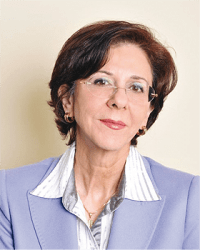

1:00 am AST - 2:30 am AST
Past Event
Content from the Brookings Doha Center is now archived. In September 2021, after 14 years of impactful partnership, Brookings and the Brookings Doha Center announced that they were ending their affiliation. The Brookings Doha Center is now the Middle East Council on Global Affairs, a separate public policy institution based in Qatar.
The Brookings Doha Center (BDC) hosted a panel discussion on February 6, 2018, which discussed the future of Jerusalem and the prospects for Palestinian unity. The panel included Mustafa Barghouti, general secretary of the Palestinian National Initiative (PNI); Rima Khalaf-Hunaidi, former U.N. undersecretary-general and executive secretary of the U.N. Economic and Social Commission for Western Asia (ESCWA); and Adeeb Ziadeh, assistant professor in international relations, Ahmed Bin Mohammed College in Qatar. Ibrahim Fraihat, former Brookings senior fellow and current associate professor and program chair of the conflict management program at the Doha Institute for Graduate Studies moderated the event, which was attended by members of Doha’s diplomatic, academic, and media communities.
Fraihat introduced the panelists and opened the discussion by emphasizing the significance of the Palestinian issue. Even though many important political and military events transpired in the region over the last 100 years, such as the Gulf War and the 2003 American invasion of Iraq, the issue of Palestine remains as a topic often discussed between Arabs. Arabs might clash with each other over politics in Syria or Egypt, but not over Palestine. He believes that Trump’s decision to transfer the American embassy to Jerusalem clearly demonstrated U.S. favoritism toward Israel, and it proved that the United States cannot serve as an unbiased mediator.
Barghouti posited that Trump’s decision indicates the elimination of the two-state solution by Israel and the United States. Past negotiations between both Israel and Palestine were of no value. He believes that the attempt to make the city of Abu Dis the new capital of Palestine is a ridiculous idea, and such a proposal ignores Palestinian history and culture.
He stated that the number of Israeli settlements increased by 120 percent since Trump became president. All of the negotiations that happened between the Palestinians and the Israelis were only an Israeli strategy to afford Israel time to build more settlements, a theory validated by the 550,000 Israeli settlements that have been built on Palestinian lands since the signing of the Oslo Accords in the 1990s. Israel is trying to prevent any Palestinian political entity from forming an independent state, and the Israeli perspective of its borders with Palestine, the Palestinian refugees, and Trump’s decision is very clear. Now with Trump’s Jerusalem declaration, Israel can ensure that the aforementioned final status issues—particularly about the return of Palestinian refugees—are eliminated from any future discussion.
Barghouti concluded his remarks with the belief that the Israeli government became an apartheid administration, not only an occupation project, and the United States is focusing more on developing a new Sunni-Israeli cooperation, rather than solving the Israeli-Palestinian conflict. Israel is refusing any peaceful solution, as it does not want to negotiate with the Palestinians unless they concede more land. Of course, Trump’s decision added legitimacy to the Palestinian liberation movement, and this step encouraged Palestinians to reconsider their goals for the future. For the Palestinians the only realistic solution left is the creation of a non-Jewish democratic state that allows Palestinians to participate in the political system. Israel completely lost its reputation of being a democratic state long ago. Trump’s decision made regional normalization of Israel and the previous strategies for peace impossible to achieve. The BDS movement will continue to grow because of these developments, with the hope that its influence will isolate Israel economically and politically from the world. Moreover, Trump’s decision will encourage the unification of Palestinian factions, previously separated inside and outside Palestine.
Khalef-Hunaidi agreed with Barghouti regarding Trump’s decision, especially that it effectively ended the prospects for achieving a two-state solution. She considers the United States’ tacit support
of the Israeli occupation of Palestinian lands as a violation of its role as a mediator. Trump’s decision to declare Jerusalem as the capital of Israel is going to precipitate conflict in the long term, especially if the U.S. embassy actually moves to Jerusalem. She also noted how Israel applied its own laws in Palestinian lands, which allowed its apartheid regime to exert complete control over Palestinian territory, even in Jerusalem. In the last few years, Israel started to withdraw its recognition of Arabic as a language used in Israel, even though 20 percent of Israelis are of Arab origin. Moreover, Israel continues to establish towns, which only Jewish communities will occupy, despite their placement in majority Palestinian neighborhoods. These new Jewish settlements will fall under the protection of Israeli national law, which will supersede the rights of the Palestinians who live in surrounding areas.
When Trump announced his decision on Jerusalem, he continued to sully the U.S.’s reputation, and further isolated the United States from the U.N. and EU positions regarding Jerusalem. Soon after Trump’s announcement, global polling figures noted that the world’s confidence in the U.S. administration fell from 59 percent to 30 percent. The ambassador of Slovenia in Israel said that Trump’s decision encouraged her government to recognize the Palestinian state. Additionally, public outrage and protest regarding Trump’s Jerusalem announcement swept through the Middle East and other parts of the world. In a way, Trump’s announcement encouraged anti-occupation initiatives from other parts of the world, not only in Slovenia, but also in Kuwait and in Tunisia with its “No to Normalization” initiative. Khalaf-Hunaidi offered the belief that various popular movements against Trump’s Jerusalem declaration forced some Arab rulers—who recently initiated normalization with Israel—to quietly step back from their decision to do so. In order for the Palestinian people to effectively counter the effects of Trump’s decision, she believes that resistance against the occupation must escalate and new leaders must come to the forefront, in order to unify the struggle of the Palestinian people.
The final panelist, Dr. Adeeb Ziadeh characterized U.S. policy toward the Middle East as being too harsh during the Trump era, as he perceived this as the result of how the Trump administration continues to exploit the fragility of some Arab states. According to Ziadeh, what is happening now is very similar to what happened in the aftermath of the 2003 invasion of Iraq, when the United States took advantage of state fragility in the Arab world. He believes that currently, there is no clear, consistent, and effective resistance to the Israeli occupation by the various Palestinian movements.
He also commented on the failure of international actors to help mediate. Ziadeh noted that the United Nations made a mistake when it postponed the issue of Jerusalem. Even the Jordanian guardianship of Christian and Muslim holy sites in Jerusalem has faced problems and its role was not clearly implemented.
The Palestinians will not participate in negotiations again if the United States serves as mediator. The Palestinian issue is the only issue in which we find an uncommon international consensus. Since the Palestinian Authority is lost and unorganized, it is now looking for countries other than the US to solve the problem after 25 years of failed negotiations. The Palestinian response to the decision to transfer the U.S. embassy to Jerusalem was weak; in fact, there was no change in the Palestinian strategy. At the end of the discussion, the panelists agreed that the path to a Palestinian state through the Oslo Accords was ruined because of these recent political developments. Now, Palestinians need to unify and find a way to think differently, outside the usual rules of the game.



Noha Aboueldahab
August 23, 2021

August 23, 2021

Yasmina Abouzzohour
August 19, 2021